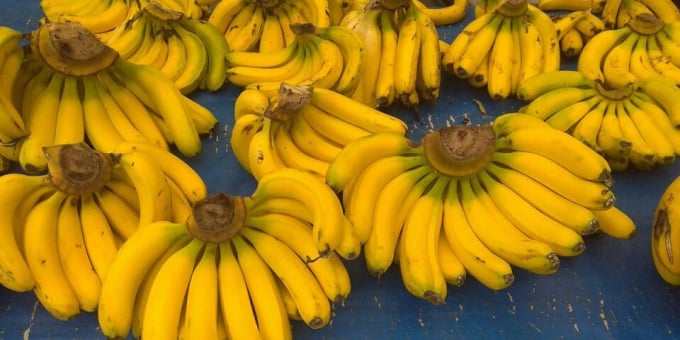November 8, 2025 | 02:27 GMT +7
November 8, 2025 | 02:27 GMT +7
Hotline: 0913.378.918
November 8, 2025 | 02:27 GMT +7
Hotline: 0913.378.918

The global market for bananas, one of the most popular fruit on the planet, has experienced a number of shocks: information is spreading in many countries’ media about imminent complete disappearance of bananas, and their prices are high everywhere, according to EastFruit.
The average price of bananas jumped the most in Russia – one and a half times, and now they are sold on the Russian wholesale market at $ 1.44/kg average. At the same time, only in the Central Asia, where prices are traditionally high due to its logistical remoteness, bananas are more expensive than in the Russian Federation. Bananas are now offered on average at $ 1.57/kg and $ 1.99/kg in Tajikistan and Uzbekistan, respectively.

Meanwhile, bananas in Belarus are in average 25% more expensive than a year earlier (on average $ 1.31/kg), and in Poland and Georgia, prices for bananas increased by an average of 21%. Prices have increased the least in Moldova, Ukraine and Tajikistan – only by 9% in the Moldovan market and by 6% each in Ukraine and Tajikistan.
What is driving banana prices up in the whole region of Eastern Europe and Central Asia? EastFruit suggests analyzing the situation in Ecuador, a key supplier of bananas both in the global market as a whole, and in almost every market of the countries monitored.
There were severe social protests in Ecuador in the fall of 2019, that the government even had to move the capital to another city, and the country was simply paralyzed. A few months later, the COVID-19 pandemic begun and literally devastated the country, putting it on the brink of a humanitarian disaster. As a result, according to the local Central Bank, cited by the BBC, the country’s economy fell by 8% in 2020.
The country’s plummeting economy, the rapid spread of COVID-19, as well as a sharp decline in spot prices for bananas due to weakening global demand in 2020, have not helped the banana industry in Ecuador. In addition, the quality and export of Ecuadorian bananas were hit hard by the eruption of the Sangay volcano in September, which repeated in March 2021. As a result, after the record export of bananas in 2020, the exports from Ecuador fell again in the first months of 2021.
Meanwhile, demand for bananas from Ecuador has unexpectedly increased in the US market, a less traditional destination for them. After floods swept across Central America in November 2020, banana production was hit hard in Guatemala, Honduras and other countries in the region that focused primarily on supplies to the United States. Thus, the majority of Ecuadorian exporters reoriented to the American market, and banana exports to the Russian Federation fell in the first quarter of 2021, while the United States purchased more bananas from Ecuador.
The Ecuadorian exporters also note a slight decrease in demand for bananas from Russia . The Russian Federation, against the backdrop of COVID-19 crisis, significantly reduced both the supply of natural gas and oil in 2020.
Therefore, when imported fruits had risen in price, the demand for them decreased on the Russian market. In addition, the Russian ruble has somewhat depreciated over the year, and imported products have become more expensive on the domestic market.
Similar currency trends were observed over the year in the markets of other EastFruit countries, except for Moldova and Poland, where national currencies slightly strengthened.
All these trends contribute to a gradual increase in prices for bananas everywhere, and add to the rumors that bananas might completely disappear in South America.
A major threat to the banana industry is now the Tropical Race 4 (TR4) disease, which primarily affects the exported Cavendish. Cases of plantation infections in South America have already been reported in 2019, and in April this year, a case was confirmed in Peru, neighbor of Ecuador.
In the meantime, Ecuadorian exporters report no cases of TR4 detection in the country and state that they are constantly monitoring the situation, but the threat can be serious.
Cavendish became the most exported banana variety in the 1950s when the rapid spread of TR4 literally wiped out Gros Michel plantations in South America. The Gros Michel variety was previously the leader in exports from the region.
EastFruit

(VAN) Interview with Kaveh Zahedi, FAO’s Director for Climate Change, Biodiversity and Environment.

(VAN) China has begun purchasing U.S. farm products after leaders of both countries met last week, but traders await soybean purchases after the White House said Beijing pledged to buy 12 million tons by year-end.

(VAN) The State of Food and Agriculture 2025 report focuses on land degradation caused by human activities.

(VAN) Brazil on Monday opens three weeks of events linked to the COP30 climate summit, hoping to showcase a world still determined to tackle global warming.

(VAN) The US egg industry has undergone a fundamental decade-long transformation, transforming to a sophisticated, value-added sector primarily defined by the shift to cage-free production, according to a recent analysis by Rabobank.

(VAN) Rice fell to 21,200 won per kilogram in Pyongyang as fresh corn reaches markets and imported grains enter through border cities.

(VAN) Latest Global Forest Resources Assessment provides detailed analyses for 236 countries and areas.